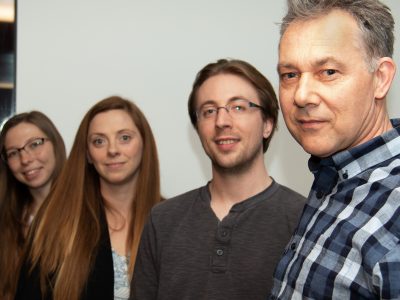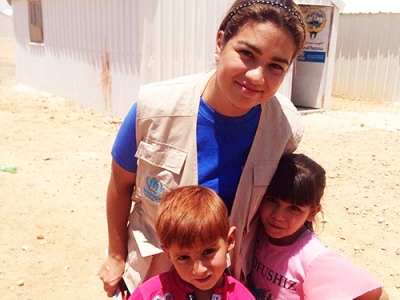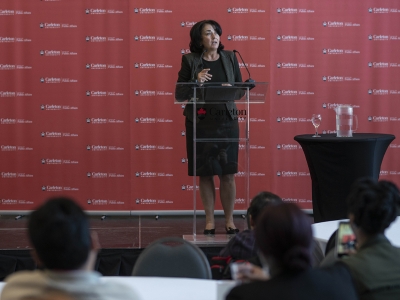By Mary Giles
While working full-time in Iqaluit, Nunavut, Karla Abbott and Mishael Gordon completed the part-time, online graduate diploma in Indigenous Policy and Administration (IPA).
Both Abbott and Gordon joined the IPA program in Spring 2019. In non-pandemic times, the program kicks off with a two-week in-person institute in June where the students meet each other on Carleton campus before heading home to complete the rest of the program online.
“I’m thankful to have met Mishael at the summer institute,” says Abbott. “With distance education, its harder to build connections with classmates and you often miss out on some of those social learning opportunities. Having a classmate in town gave me those opportunities while still providing the accessibility of online learning.”
Gordon says, “I was so grateful to have Karla as an IPA program companion here in Iqaluit, to trouble shoot anything we had regarding assignments. It was so beneficial to have a course-mate here to work with, but also to support one another. This was a huge advantage since it can be a challenge to connect over a distance.”
Karla Abbott
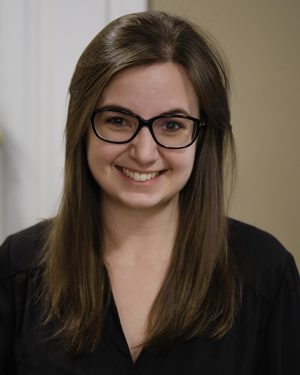
Karla Abbott
“I applied to the program because I was interested in broadening my knowledge and understanding of Indigenous-Canada history, relations, law and governance,” says Abbott.
“Over the last eight years, I worked in various environmental management positions in the Nunavut Settlement Area. Although I had the science background for these positions, I always felt that I lacked foundational knowledge on Indigenous law, governance and the social and economic considerations inherent to Indigenous policy development and implementation. The IPA program helped fill that gap.”
Abbott is from Newfoundland and completed an MSc in Biology at Memorial University in 2013 before moving to Iqaluit to work as a wildlife management biologist with the Nunavut Wildlife Management Board. “I worked closely with Inuit and other co-management partners on terrestrial and marine wildlife conservation and management issues in the Nunavut Settlement Area.”
She is currently the Planning and Implementation Manager with Parks Canada Nunavut Field Unit. “My colleagues and I work with Inuit partners and other stakeholders on the development of management plans for National Parks,” she says. “I also advise on Parks Canada’s implementation of modern treaty obligations, including monitoring, evaluating and reporting on implementation of Inuit Impact and Benefit Agreements for Parks Canada sites in the Nunavut Settlement Area.

Iqaluit, photo by Mark Abbott
“My interests are in ecosystem conservation and natural resource management approaches that are based on co-management partnerships with Indigenous Peoples, weaving together western and Indigenous knowledge systems and ways of knowing.
“Living in Iqaluit without easy access to university courses, I was excited to find such a specialized diploma program that was offered online and accommodating to full-time workers,” she says. “However, I’m really glad the program also included a two-week, in-person summer institute. It was great meeting other students in my cohort, putting names to faces and learning from their experience and knowledge.”
Mishael Gordon
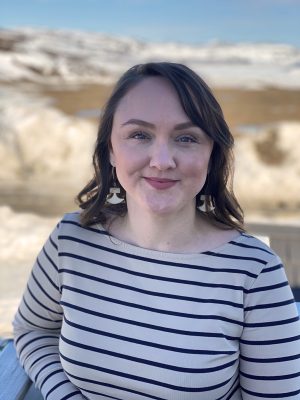
Mishael Gordon
“My hometown is Rankin Inlet, but I enjoy living and working in Iqaluit, Nunavut’s capital,” says Gordon.
When Gordon entered the IPA program, she was in project management for the Department of Health in the Government of Nunavut. During the time span over the part-time, two-year program, she became a manager.
“The IPA program helped me to understand how policy decisions are made and how this impacts Indigenous communities. I have a background in nursing and have a strong passion for social equity. I felt empowered by participating in the IPA program with having a sense of what has been done, what is being done and what solutions could be implemented for Indigenous Canadians.
“I also learned to think critically about resource distribution from the federal government for jurisdictions, as well as how administration impacts these decisions.”
“The COVID-19 pandemic impacted all health services,” she says. “It was a challenging time to continue to work in health protection, take care of my children and continue to focus on my studies. The biggest challenge for me was to balance multiple roles. I recently decided to leave the Government to build a consulting business on health and social well-being.
“I am a stronger writer now than I had been prior to this program. It also helped me build my research skills in order to start any new opportunities, whether academic, personal or professional.”
Friday, June 18, 2021 in 2021 Graduation, Convocation, FPA Voices, Students
Share: Twitter, Facebook
